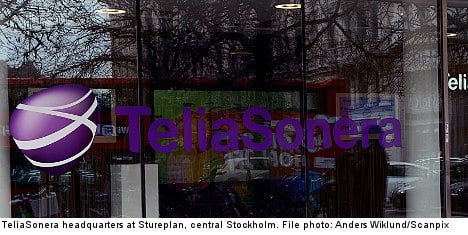Norman urged the board to consider the move in order to safeguard the reputation of company, which is partially owned by the Swedish state.
TeliaSonera faces claims that employees took bribes and that several of them knew they were dealing with Gulnara Karimova, the daughter of Uzbekistan president Islam Karimov, in setting up its relationship with a business partner in the central Asian market.
The suspicions stem from a September report by Sveriges Television (SVT) investigative news programme “Uppdrag granskning” claiming that TeliaSonera had paid 2.2 billion kronor ($333 million) to Takilant Limited to obtain a 3G licence in Uzbekistan and a 26 percent stake in mobile carrier Ucell.
Takilant is owned by a 22-year-old woman with links to the daughter of the Uzbek dictator.
Several emails between senior managers within the company mention Gulnara Karimova by name and have been presented as evidence by prosecutors in the ongoing investigation.
Meanwhile, shareholders appear to be following the case closely. The Stockholm Stock Exchange has asked the company for more information, reported Dagens Nyheter (DN) this week.
“We demand a press release from companies regarding anything that could affect the share price, including criminal suspicions,” stock exchange spokesman Carl Norell told the newspaper, without specifically confirming that they had contacted TeliaSonera.
However, a company official confirmed TeliaSonera had been contacted by stock exchange officials.
Efforts to investigate the claim have also taken place internally in the company. But Sveriges Television (SVT) alleged in December that an audit into whether certain employees had taken bribes, as claimed by businessmen in Uzbekistan, was superficial and insufficient.
The auditors, Ernst & Young, themselves said in their final report that the audit “was not compatible with widely accepted standards”.
An independent Swedish auditor, Einar Häckner, called the final review a ”whitewash,” aimed at clearing the company of any allegations of wrongdoing.
“I interpret this as wanting to open closets where you know there are no skeletons hiding,” he told SVT.
Earlier in the week, Norman said evidence showing the TeliaSonera managers knew they were dealing with Karimova were “very serious”.
“As I’ve said before, the most important thing is that the company gets to the bottom of this and that all the information comesout so that the owners and the public gets a picture of what happened,” he told TT in an email.
TeliaSonera has denied it is not taking the allegations seriously.
”We’ve looked into this, Ericsson has looked into it, as have Ernst & Young, Control Risk and Price Waterhouse Cooper and everyone agrees. There is nothing to suggest fraud has taken place,” press secretary Salomon Bekele wrote in an email to the TT news agency in December.
On Tuesday, the company remained resistant as the minister suggested that certain senior managers take some time off.
“[We are] continuously following up on the question of suspicions related to TeliaSonera’s investment in Uzbekistan,” board chairman Anders Narvinger responded in a written statement.
He said the board would not order any senior executive to take time off unless more information is uncovered in the ongoing investigation, he added.
“In the event of new information, which leads to a strengthening of the degree of suspicion against senior executives, the board will of course consider the need for a time-out.”
TT/The Local/at



 Please whitelist us to continue reading.
Please whitelist us to continue reading.
Member comments